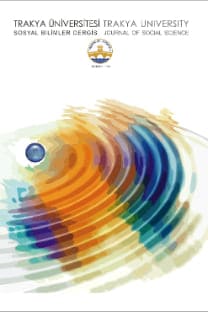LİSE ÖĞRENCİLERİNİN ÖĞRETMENLERİNE YÖNELİK İLETİŞİM ALGILARININ VE DOYUM DÜZEYLERİNİN İNCELENMESİ
Öğrenci doyumu, eğitim kurumunun sağladığı hizmetlerin öğrenciler tarafından değerlendirilmesi neticesinde öğrencilerin ulaştıkları mutluluk ve tatmin duygusu olarak belirtilmektedir. Gelişimsel krizlerin yoğun yaşanmakta olduğu ergenlik döneminde ise, öğrenciler ile öğretmenler arasındaki etkili iletişim ve öğrencinin eğitim ortamına ilişkin doyumu eğitim amaçlarının gerçekleştirilmesi bakımından önemlidir. Bu nedenle, öğretmen-öğrenci arasındaki iletişimi ve öğrenci doyumunu etkileyen unsurların belirlenmesi ve bu yönde farkındalığın arttırılması, eğitim ortamlarının daha verimli hale getirilmesi hususunda gereklilik arz etmektedir. Bu amaçla öğrenci doyumunu ve öğrenci-öğretmen arasındaki iletişimi etkileyen faktörlerin ele alındığı bu çalışmada İstanbul ili Beşiktaş ilçesinde farklı lise türlerinden eğitimine devam eden 1063 öğrenciyle anket uygulaması yapılmıştır. Araştırmada elde edilen bulgulara göre Anadolu Liselerinde öğrenim gören ve genel popülasyonda 11. sınıfa devam eden öğrencilerin doyumunun diğer gruplara göre daha yüksek olduğu görülmüştür.
Anahtar Kelimeler:
İletişim, sosyo-psikolojik doyum, eğitim psikolojisi, eğitim sosyolojisi
EXAMINATION OF HIGH SCHOOL STUDENTS’ PERCEPTIONS OF COMMUNICATION TOWARDS THEIR TEACHERS AND SATISFACTION LEVEL
Student satisfaction is defined as the happiness and satisfaction of the students as a result of the evaluation of the services provided by the educational institution. During the adolescence period when the developmental crises are intense, the effective communication between the students and the teachers and the satisfaction of the student about the educational environment is important for the realization of educational objectives. For this reason, it is necessary to determine the factors affecting the teacher-student communication and the factors affecting student satisfaction and to increase the awareness in this way, in order to make the educational environments more productive. In this study where the factors affecting student satisfaction and student-teacher communication were discussed, a questionnaire was applied with 1063 students attending different high school types in the province of Beşiktaş in Istanbul and the students who were educated in the Anatolian High Schools in terms of the obtained data, were found to be higher than the other groups.
Keywords:
Communication, socio-psychological satisfaction, educational psychology, educational sociology,
___
- Aldemir, C. ve Gülcan, Y. (2004). Student satisfaction in higher education: A Turkish case. Journal of Higher Education Policy and Management, 16(2). 109-122. 10.1787/17269822
- Arslan, A. (2018). Ortaokul öğretmenlerinin öğrencilerin ergenlik problemlerine ilişkin kullandıkları çözüm stratejileri. Atatürk Üniversitesi Kazım Karabekir Eğitim Fakültesi Dergisi.(37). 57-84
- Astin, A.W. (1993). What matters in college: Four critical years revisited. San Francisco: Jossey-Bass Higher and Adult Education.
- Borden, V. M. (1994). Segmenting Student Markets with a Student Satisfaction and Priorities Survey. AIR 1994 Annual Forum Paper.
- Büyükşahin Çevik, G., Yavuz G. ve Güzel Yüce S. (2016). Ergenlerin okul yaşam kalitesi ile yaşam doyumunun problem çözme ve sosyal destekle ilişkisi: Afgan-Özbekleri ile yapılan bir yapısal eşitlik modeli çalışması. Uluslararası Sosyal Araştırmalar Dergisi, 9(43). 1405-1417.
- Cüceloğlu, D. (1997). İçimizdeki çocuk. (15. Basım). İstanbul: Remzi Kitabevi.
- Çam, M. (2007). Ortaöğretim kurumlarında öğrenci doyumu: Ankara Örneği. (Yayınlanmamış Yüksek Lisans Tezi). Ankara Üniversitesi Eğitim Bilimleri Enstitüsü, Ankara.
- Çetinkaya, Z. (2011). Türkçe öğretmen adaylarının iletişim becerilerine ilişkin görüşlerinin belirlenmesi. Kastamonu Eğitim Dergisi, 19(2). 567-576.
- Dilekmen, M., (2008). Etkili öğretim için etkili öğretmenlik. Atatürk Üniversitesi Sosyal Bilimler Dergisi, 12(2). 213-221.
- Dökmen, Ü. (2002). İletişim çatışmaları ve empati (20. Basım). İstanbul: Sistem Yayıncılık.
- Elliot, K. M. and Shin, D. (2002). Student satisfaction: An alternative approach to assessing this important concept. Journal of Higher Education Policy and Menagement, 24(2). 197-209.
- Gölönü, S. ve Karcı, Y. (2010). İletişim meslek lisesi öğrencilerinin iletişim beceri düzeylerinin incelenmesi (Ankara il örneği). İletişim Kuram ve Araştırma Dergisi, (31). 123-140
- Görür, D. (2001). Lise öğrencilerinin iletişim becerilerini değerlendirmelerinin bazı değişkenler aşısından incelenmesi. (Yayımlanmamış Yüksek Lisans Tezi). Çukurova Üniversitesi Sosyal Bilimler Enstitüsü, Adana.
- Hallilan M. T. (2008). Teacher influences on students’ attachment to school. Sociology of Education, 81(3). 271-283. 10.1177/003804070808100303
- Öztaban A. ve Satıcı, A.F. (2015). Bilişim teknolojik alanında eğitim gören ortaöğretim öğrencileri doyum ölçeği: Geçerlilik ve güvenirlik çalışmaları. Mesleki Bilimler Dergisi, 4(1). 1-7.
- Pattama, R. (2003). Student Satisfaction in Thai Private Vocational Schools. Doctorate Dissertation. Department of Educational Administration and Foundations Illionis State University
- Reed, V. A., McLeod, K., ve McAllister, L. (1999). Importance of selected communication skills for talking with peers and teachers: Adolescent’ opinions. Language, Speech and Hearing Services in Schools, 30(1). 32-49. 10.1044/0161-1461.3001.32
- Sakız, G., (2016). Effective teaching and improving teacher quality Kuramsal Eğitimbilim Dergisi, 9(2). 214-244. 105578/keg.10451.
- Stage F. ve Rushin P. W., (1993). A combined model of student predisposition to college and persistence in college. Journal of College Student Development, 34(4). 276-281. Tavşancıl, E. (2005). Tutumların ölçülmesi ve SPSS ile veri analizi. Ankara: Nobel Akademik Yayıncılık.
- Trudeau, C. S. (1999). A Study of Overall Student Satisfaction and The Factors Influencing Satisfaction At A Midwestern Church Related College. Doctorate Dissertation. Education in the Department of Higher Education Indiana University
- Ulyatt, D. (2003). Satisfaction of students and administrators toward support systems in online degree programs: A case study. Doctorate Dissertation. New Jersey: Seton Hall University.
- Wince, M. H., & Borden, V. M. (1995). When Does Student Satisfaction Matter? AIR 1995 Annual Forum Paper.
- Wiers-Jenssen, J., Stensaker, B. ve Grogaard, J.B. (2002). Student satisfaction: Towards an empirical deconstruction of the concept. Quality in Higher Education, 8 (2). 183-195.
- Wang M., and Holcombe, R. (2010). Adolescents' perceptions of school environment, engagement and academic achievement in middle school. American Educational Research Journal, 47. 633-662.
- ISSN: 1305-7766
- Yayın Aralığı: Yılda 2 Sayı
- Başlangıç: 2000
- Yayıncı: Trakya Üniversitesi Sosyal Bilimler Enstitüsü
Sayıdaki Diğer Makaleler
EĞİTİMDE DİJİTAL DÖNÜŞÜM: MOBİL ÖĞRENMENİN MENTAL İYİ OLUŞ DÜZEYİ AÇISINDAN İNCELENMESİ
Mehmet YILMAZ, Gökşen ÜÇÜNCÜ, Selçuk ARIK
BAŞLANGIÇ SEVİYESİ KEMAN EĞİTİMİNDE POZİSYON GEÇİŞİ
UVEYS BAHADIR HAN’IN İLKANLI DEVLETİ TAHTINA ÇIKIŞI VE SİYASİ YAŞAMI
Yılmaz ÇAKICI, Hülya SÖYLEYİCİ, Emrah OĞUZHAN DİNÇER
TÜRKİYE VE SİNGAPUR EĞİTİM İSTATİSTİKLERİ ÜZERİNE KARŞILAŞTIRMALI BİR ÇALIŞMA
Abdulkadir IŞIK, Emine Seda KOÇ
TRAKYA ÜNİVERSİTESİ’NDEN BİR SOSYAL SORUMLULUK PROJESİ: “GELECEĞİM SENSİN”
LİSE ÖĞRENCİLERİNİN ÖĞRETMENLERİNE YÖNELİK İLETİŞİM ALGILARININ VE DOYUM DÜZEYLERİNİN İNCELENMESİ
